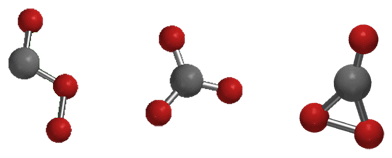三酸化炭素
表示
三酸化炭素(さんさんかたんそ、Carbon trioxide)は、二酸化炭素と酸素原子との不安定な反応生成物である[1]。一酸化炭素と酸素との反応でも検出される。炭酸イオン(CO32-)とは別物である。コロナ放電の負電荷側で見られる[2]。これはプラズマの自由電子によって酸素分子から生じた酸素原子イオンと、二酸化炭素との反応である。
三酸化炭素には3つの異性体が可能で、図の左からCs、D3hそして C2vである。C2vは様々な研究から基底状態であることが証明されている[3]。
脚注
[編集]- ^ Sabin, J. R.; Kim, H.. “A theoretical study of the structure and properties of carbon trioxide”. Chemical Physics Letters 11 (5,): 593-597.
- ^ SpringerLink Home - Main
- ^ “アーカイブされたコピー”. 2012年6月30日時点のオリジナルよりアーカイブ。2012年6月30日閲覧。
- Electronic structure and spectroscopy of carbon trioxide
- Sabin J. R., Kim H. (1971). “A theoretical study of the structure and properties of carbon trioxide”. Chemical Physics Letters 11 (5): 593-597. doi:10.1016/0009-2614(71)87010-0.
- Sobek V., Skalný J. D. (1993). Czechoslovak Journal of Physics 43 (8). http://www.springerlink.com/(3xbvg4fk245a5l45su5fwm55)/app/home/contribution.asp?referrer=parent&backto=issue,5,9;journal,147,588;linkingpublicationresults,1:106035,1.
- Pople J. A. , Seeger U., Seeger R., パウル・フォン・ラーゲ・シュライアー (2004). “The structure of carbonate”. Journal of Computational Chemistry 1 (2): 199 - 203. doi:10.1002/jcc.540010215.
- Moll N. G., Clutter D. R., Thompson W. E. (1966). “Carbonate: Its Production, Infrared Spectrum, and Structure Studied in a Matrix of Solid CO2”. The Journal of Chemical Physics 45 (12): 4469-4481. doi:10.1063/1.1727526.
- Gimarc B. M., Chou T. S. (1968). “Geometry and Electronic Structure of Carbon Trioxide”. The Journal of Chemical Physics 49 (9): 4043-4047. doi:10.1063/1.1670715.
- DeMore W. B., Jacobsen C. W. (1969). “Formation of carbon trioxide in the photolysis of ozone in liquid carbon dioxide”. Journal of Physical Chemistry 73 (9): 2935 - 2938. doi:10.1021/j100843a026.
- DeMore W. B., Dede C. (1970). “Pressure dependence of carbon trioxide formation in the gas-phase reaction of O(1D) with carbon dioxide”. Journal of Physical Chemistry 74 (13): 2621 - 2625. doi:10.1021/j100707a006.
- Francisco J. S., Williams I. H. (1985). “A theoretical study of the force field for carbon trioxide”. Chemical Physics 95 (3). doi:10.1016/0301-0104(85)80160-9.

